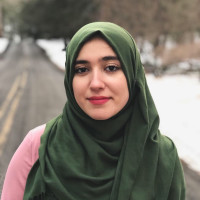Hebh Jamal, a Palestinian-American journalist who grew up in New York, is currently living in Germany and facing legal prosecution due to her activism for Palestine. This remarkable woman has been at the forefront of the fight for Palestinian rights, raising her voice against injustice.
In a recent episode of PalCast, available on Apple & Spotify, Hebh, along with Yousef Aljamal, Helena Cobban, and Tony Groves, discussed the German position on Israel in relation to its history and their declared commitment to human rights. The conversation highlighted the global solidarity for Palestine, from Berlin to New York, and how this collective voice is contributing to the end of apartheid in Palestine after 200 days of genocide in Gaza.
Pro-Palestine protesters worldwide are sending a clear message: “We are with Palestine.” However, the response from authorities has been less than supportive. The German police shut down the Berlin Congress on Palestine, where Hebh was speaking. Similarly, the administration of Columbia University in the U.S. responded to student protests by calling the police.
Hebh has been quietly making waves in Germany’s political and press elite, a group she identifies as having a vested interest in smearing any discussion of Palestinian identity as an infringement against the state of Israel. After moving from New York to Mannheim in Germany, she experienced a culture shock transitioning from New York’s openness to the traditional views she faced in Baden-Württemberg. This compelled her to document the world of Islamophobia, censorship, and injustice unfolding before her.
Hebh made her political debut fighting inequality as a teenager in The New York Times and Teen Vogue and has continued her work as a social commentator both in America and Germany. Her work over the past year has documented the state of censorship in modern Germany and has been featured in Al Jazeera and +972 Magazine.
As a Palestinian-American from the Bronx, New York City, Hebh initially considered a career in academia. However, she soon realized the systemic racism embedded in these structures. Rather than subjecting herself to potential racism, she chose to write without a title, documenting the experiences and suppression of Palestinians. This endeavor has kept her busy, as she puts it, “Germany has kept me very busy!”
Hebh gave herself a timeline to make it as a writer in Germany. She wanted to feature the voices of people who are similar to her and who have had a similar experience. In her words, “You could say it is an almost selfish endeavor to tell the story of my identity and how it has been extremely politicized here.”
For a full interview with Hebh, please click here.

